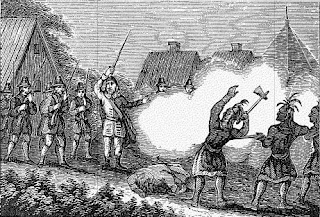Was Machiavelli right in his theory? In THE PRINCE Machiavelli describes a regimen on how a prince should behave when it comes to leadership. Alliances are weak he says. Never be in an alliance unless you have the upper hand or you will always have to be answering to someone else. He also said that instilling fear is important or the opposing party will not respect you or overthrow you. My favorite quote in The Prince is "you should seem to be compassionate, trustworthy, sympathetic, honest, religious, and indeed, be all these things; but at the same time you should be constantly prepared, so that, if these become liabilities, you are trained and ready to be their opposites". Sounds like what the Pilgrims did. They were able to be flexible. Is this similar to the paradigm of Todorov we explored earlier? In this situation, is colonialism about deceit in order to survive?
 The feast of Thanksgiving is not your happy Hallmark card. It is a story of betrayal, of bloodshed. So what is the real story? Why does it matter? What does it mean in the realms of IR theory? Well when the Pilgrims first came to the "New World", after the first winter, 1/2 of their population passed away. 50 people are so remained. The Wampanoag people who lived in the area saw how the pilgrims were interacting. They realized that the pilgrims were not so much of a threat. Why? Because they were dying off, were starving, and had brought along women in children. From a cross cultural perspective, the natives believed women and children should not be involved in warfare. It was exogenous to their customs so they did not see the immigrants as malicious. Massasoy, the tribal leader of the Wompanoag believed that they should make an alliance with the pilgrims because they saw how strong their weaponry was. Massasoy was afraid that other tribes in the Massachusetts area would harm his tribe because of the dwindling numbers of Wompanoag in the region due to an epidemic. He needed support. He was able to make a strong alliance with the pilgrims. They were in need. A treaty was negociated in which the English settlers would protect Massasoy's tribe while the Wampanoag must teach the colony how to farm and live off the land. The alliance was strong and peaceful. Massasoy and his tribe were under the protection of the English and the English learned the skills of the land. There was a mutual respect and gratification. They began to adapt each others way of living to their own. Indian language, furs, and cooking methods were used by the Pilgrims while the Wampanoag had guns and steel for daggers.
The feast of Thanksgiving is not your happy Hallmark card. It is a story of betrayal, of bloodshed. So what is the real story? Why does it matter? What does it mean in the realms of IR theory? Well when the Pilgrims first came to the "New World", after the first winter, 1/2 of their population passed away. 50 people are so remained. The Wampanoag people who lived in the area saw how the pilgrims were interacting. They realized that the pilgrims were not so much of a threat. Why? Because they were dying off, were starving, and had brought along women in children. From a cross cultural perspective, the natives believed women and children should not be involved in warfare. It was exogenous to their customs so they did not see the immigrants as malicious. Massasoy, the tribal leader of the Wompanoag believed that they should make an alliance with the pilgrims because they saw how strong their weaponry was. Massasoy was afraid that other tribes in the Massachusetts area would harm his tribe because of the dwindling numbers of Wompanoag in the region due to an epidemic. He needed support. He was able to make a strong alliance with the pilgrims. They were in need. A treaty was negociated in which the English settlers would protect Massasoy's tribe while the Wampanoag must teach the colony how to farm and live off the land. The alliance was strong and peaceful. Massasoy and his tribe were under the protection of the English and the English learned the skills of the land. There was a mutual respect and gratification. They began to adapt each others way of living to their own. Indian language, furs, and cooking methods were used by the Pilgrims while the Wampanoag had guns and steel for daggers.But more and more settlers started coming in! And land was being taken from the Indians Massasoy and his people were being cheated. Endemics due to exogenous pathogens killed the native population. Puritans believed this was a message from their god that they had the right of ownership to Indian land. If we play off the Sapir-Wharf linguistic theory that language shapes perception, the word for 'my earth' to the natives is 'natakwey' which means the earth is me and I am the earth. It does not translate to I own the Earth. Native populations didnt understand why the English wanted to own land for status because in their own culture, everyone was entitled to land because they were a fragmant of the earth. Natives were cheated. After Massasoy passed away, his son Phillip came to power. Phillip was sick of being treated like a second class citizen. The pilgrims attempted to take his guns, his religion, his corn, his land, and his livelihood. There was only one thing to do. And that was to lash out. But soon the battle was lost. The English butchered Indian villages and took the land for good. There was nothing left but vacant land for the settlers to build on.

I am not sure that they the Pilgrims had to be deceiving in order to survive. Something tells me there is more to this story. Let us explore. Was it all about power struggle? From this example it seems so. The Indians were cheated out. They did not have suffient weaponry. They were not strong enough. And by strong I mean cunning and powerful at the same time. Machiavelian tactics were utilized in this chapter of New England history. I think conquest is inevitable here. The end result was going to happen. You have a people who live on land and worship it with organic objects for defence while an exogenous determined people with steel guns want the very land the native population is on, you know what is going to happen. But the time it took and the stallings are variable. Now wer reflect and feel bad. That is why documentaries are made about these events. So we can watch and shake our heads in disbelief. But 100-200 years ago, that sentiment would not be there. Machiavelli's theory is inevitable. But that does not make it right. People are still people. Even if there are such differences. But to the colonies, Indians were not people. They were savage. They needed to be tamed. Egocentrism was the fuel to the fire.


No comments:
Post a Comment